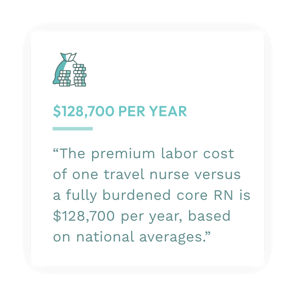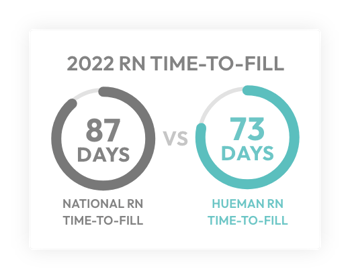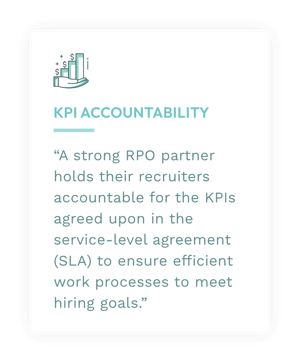Outsource the Recruitment Process, Not the Nurses
 With a travel nurse staffing agency, you’re paying for the nurse, overhead, travel, and lodging, all with an enormous markup. On average, hospitals spend $125/hour for a travel nurse versus $45/hour + benefits burden for a core staff RN. The result; the premium labor cost for one travel nurse averages $128,700 annually.
With a travel nurse staffing agency, you’re paying for the nurse, overhead, travel, and lodging, all with an enormous markup. On average, hospitals spend $125/hour for a travel nurse versus $45/hour + benefits burden for a core staff RN. The result; the premium labor cost for one travel nurse averages $128,700 annually.
In contrast, engaging with a partner to outsource the recruiting process could save you millions. (In fact, Hueman RPO helped a partner save $48 million+ by decreasing their travel nurse usage by 61%.)
RPO, or recruitment process outsourcing, is a form of business outsourcing where a hospital or healthcare system transfers all or part(s) of its recruitment process to an RPO partner. Partnering with an RPO can help hospitals reduce travel nurse dependency by quickly hiring qualified core staff nurses.
With an RPO, you are investing in a team of experts who dedicate 100% of their time to sourcing and recruitment efforts to find core staff candidates that align with a hospital system’s culture and values. This partnership provides dedicated and managed recruiters, advertising dollars, technology, tools, and best practices for sourcing.
Hueman RPO Travel Nurse Reduction Program
We launched our Travel Nurse Reduction Program in response to the financial difficulties many healthcare systems are experiencing due to an over-reliance on travel nurses. Our innovative program allows hospitals to lower premium labor expenses by filling RN openings with core staff nurses.
Using our seven-step program, our dedicated recruiting team measures themselves and focuses all of their efforts solely on replacing travel nurses at your organization. We leverage value-based hiring tactics, cutting-edge technology, and the expertise of our recruiters to hire qualified nurses while saving you money.
Hueman has decades of experience providing world-class talent solutions to hospitals and healthcare systems. With our extensive history in the industry, we’ve grown a deep understanding of the intricacies of the healthcare industry and its unique talent challenges.
To learn more about Hueman RPO’s Travel Nurse Reduction Program, check out our dedicated solutions page or contact us today.
Hesitant to Outsource to Something New?
Despite the low-risk structure of an RPO partnership, being hesitant to outsource your recruitment is understandable. Let’s review some leaders’ most common hesitations and questions when considering an RPO partner as a solution.
"I’m already spending too much on premium labor; I can’t afford additional recruiting expenses."
Working with an RPO is a great low-risk option for health systems concerned about protecting their budgets. Often, RPOs establish service-level agreements (SLA) to help hospitals mitigate their risks. These contracts hold RPOs accountable for mutually agreed-upon performance and saving guarantees, including the number of hires, time-to-fill, and quality of hires.
The cost of an RPO partnership encompasses all recruitment-related expenses, including recruiter salaries, technology, recruitment tools, and digital marketing costs. Bundling these costs can help an organization’s bottom line in the long run. In addition to lowering premium labor spend, you can expect substantial cost-savings across the following:
- Decreased agency spend
- Reduced time-to-fill
- Reduced turnover rates
- Enhanced candidate quality
The potential cost savings may outweigh the cost of what you’re spending on travel nurses. Plus, the partnership’s valuable resources can help your long-term recruitment efforts. The right partner will work within each hospital’s unique needs and budget to curate a customized program that works for them.
"The time to implement a solution will take too long, and my team does not have the capacity to help."
An efficient implementation and transition process is crucial to set the stage for a successful partnership. Good RPO providers have dedicated implementation teams that manage the process from start to finish, requiring minimal time commitment from your team. An experienced implementation manager will use technology, processes, and best practices to quickly integrate RPO services into health systems so you can start reaping the benefits of the partnership.
RPOs also take the burden of recruitment from your HR team, giving them more time to focus on other critical business areas. They become an extension of your team, working within your systems to avoid additional expenses – including your ATS, email, and HRIS.
"I need travel nurses to maintain safe staffing levels."
Patient safety is jeopardized when a hospital is experiencing a nurse shortage, and there’s no doubt that travel nurses have helped lower that risk in recent years. However, safe staffing levels can be attained by filling open staff nursing positions and minimizing the number of travel nurses to an appropriate level that does not deplete your budget. The proper balance of travel nurses with core staff nurses is integral for budget health, patient care, and core values.

An RPO serves as a consultative partner that works closely with hospital teams to ensure safe staffing levels and continuity of care. Leveraging data — such as recruitment metrics and forecasting— can help health systems proactively prepare for talent needs to protect employees and patients. Another program an RPO can establish is a float-pool model to ensure the safe continuation of care.
"Is working with an RPO really going to improve our culture?"
The main challenge in hiring and retaining staff nurses is providing a work environment that allows them to do what they’re passionate about – helping patients.
An RPO can help hospitals reach adequate staffing levels by quickly hiring core staff nurses to reduce the number of travel nurses, ease the tension of pay inequities, and improve nurse retention. A good RPO takes the time to learn about your unique values and mission to hire nurses who align with your culture, resulting in stronger teams and long-term hires.
RPOs can also help hospitals meet hiring goals, including improving their DEI initiatives. They provide robust pipelines of diverse nurses through inclusive job descriptions, data-driven sourcing strategies, and interview training to build a nursing team representative of the communities you serve.
Reducing premium labor spending results in significant cost-savings that hospitals can allocate toward creating a workplace where nurses can thrive. These highly stressful past few years have left nurses yearning for a workplace where they are valued and engaged. Investing in programs to improve employee engagement and satisfaction, such as mental health and well-being programs, educational and professional advancement opportunities, and ensuring a healthy work environment can repay your hospital tenfold. A good RPO partner will offer consultative services related to employee engagement and retention that you can leverage for your workplace.
"I have an in-house recruiter; I don’t need to pay for another."

In-house talent acquisition departments typically have other areas of responsibility, such as recruiting for different departments and onboarding, that prevent them from dedicating the time needed to recruit nurses in this historically tight labor market.
RPO recruiters are highly specialized and dedicate 100% of their time to sourcing, screening, and hiring qualified candidates. Plus, they have access to the latest recruitment tools, technology, marketing, and paid advertising to attract nurses over competitors.
A strong RPO partner holds their recruiters accountable for the KPIs agreed upon in the service-level agreement (SLA) to ensure efficient work processes to meet hiring goals. Setting clear deliverables and timelines helps improve recruitment results and facilitates communication between recruiters and hiring managers, a key component to building successful partnerships.
Ready to reduce your travel nurse costs? Visit our dedicated solutions page or contact us today.






